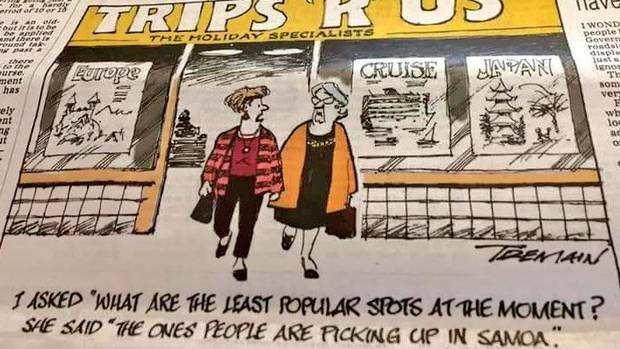A controversial New Zealand newspaper cartoon has been labelled hurtful, discriminatory and racist by the country's media council.
The Otago Daily Times (ODT) published a cartoon by Garrick Tremain on December 3 depicting the Samoan measles outbreak.
The illustration showed two women leaving a travel agency with the caption reading: "I asked 'what are the least popular spots at the moment?' She said 'the one people are picking up in Samoa'."
At the time the cartoon was published a measles epidemic was sweeping Samoa and had killed 62 people, 52 of them babies and children.
Over the next few days the Media Council received more than 130 complaints, many calling the cartoon racist, heartless, callous and causing a "wave of trauma and hurt".
The ODT's editor Barry Stewart responded to the council and catalogued the newspaper's response to the more than 2000 complaints and comments received within 24 hours of the cartoon being published.

An initial online and print apology, he noted, had not been accepted by an outraged community and "it was clear the newspaper needed to restate and reinforce its apology at length, in detail and with prominence".
A detailed apology was later published online and in print.
Further commitments were made by the ODT, including an immediate change to the way the cartoon is considered and selected and an independent review by Deloitte of the processes leading to the cartoon's publication.
The council said it hoped the Deloitte review will be made public.
Tremain's work will also not be considered for publication during that time, while Stewart has also met with representatives of the Dunedin Samoan community to apologise.
In its decision, published online today, the Media Council noted it has only rarely upheld a complaint against a cartoon.
Previous decisions, it said, have acknowledged cartoons "are given a wide licence to offend" and offer confronting and affronting views that are "often strong and pungent".
"Cartoonists employ wit, satire, exaggeration, caricature and humour to make a point. A few deft stokes of the pen and a few well-chosen words can do what would otherwise take many words to express.
"Cartoons often deal with grave situations and can make fun of unfunny events; by their nature they will often cause offence. That is a freedom to be defended. However, even with cartoons there is a line of gratuitous offence and hurt which when crossed can constitute a breach of the professional standards by the media.
"This is such a cartoon."
The council said the Tremain cartoon had "no redeeming qualities" and was "a weak attempt at humour".
"It showed no human understanding of the dire situation Samoa was facing.
"We note that other cartoonists have commented on the unspoken rule of cartooning - 'punch up, not down. This cartoon broke that rule."
The initial responses from the editor and cartoonist were also criticised by the council for showing "no comprehension of the enormity of the insult and hurt".
There was also a "them and us" quality about the cartoon, the council's decision read.
"The insensitivity of joking about a deathly epidemic is made worse by this quality of being invited to laugh at the plight of people who are seen as different from 'us'.
"We consider it highly discriminatory. It has a racist quality, being that other lives do not matter as 'ours' do. It invites laughter at an epidemic that is causing illness and death, the implication being this is acceptable because the victims are 'not us'."
Freedom of expression, the council said, plainly has bounds.
"We find that the cartoon was gratuitously hurtful and discriminatory. Despite the very high bar that must be crossed before a complaint about an offensive cartoon will be upheld, that bar was crossed with this cartoon, and by a significant margin."
The ODT cartoon drew similarities to two Fairfax Media newspaper cartoons which Labour MP Louisa Wall claimed were hate speech against Māori and Pasifika.
The 2013 depictions of the Government's Food in Schools programme portrayed Māori and Pasifika as "welfare bludgers and negligent parents".
But in a landmark and precedent-setting High Court decision last year, a panel of three ruled - that while the cartoons were insulting - free speech was too important and too delicate of a right for a court to restrict.




